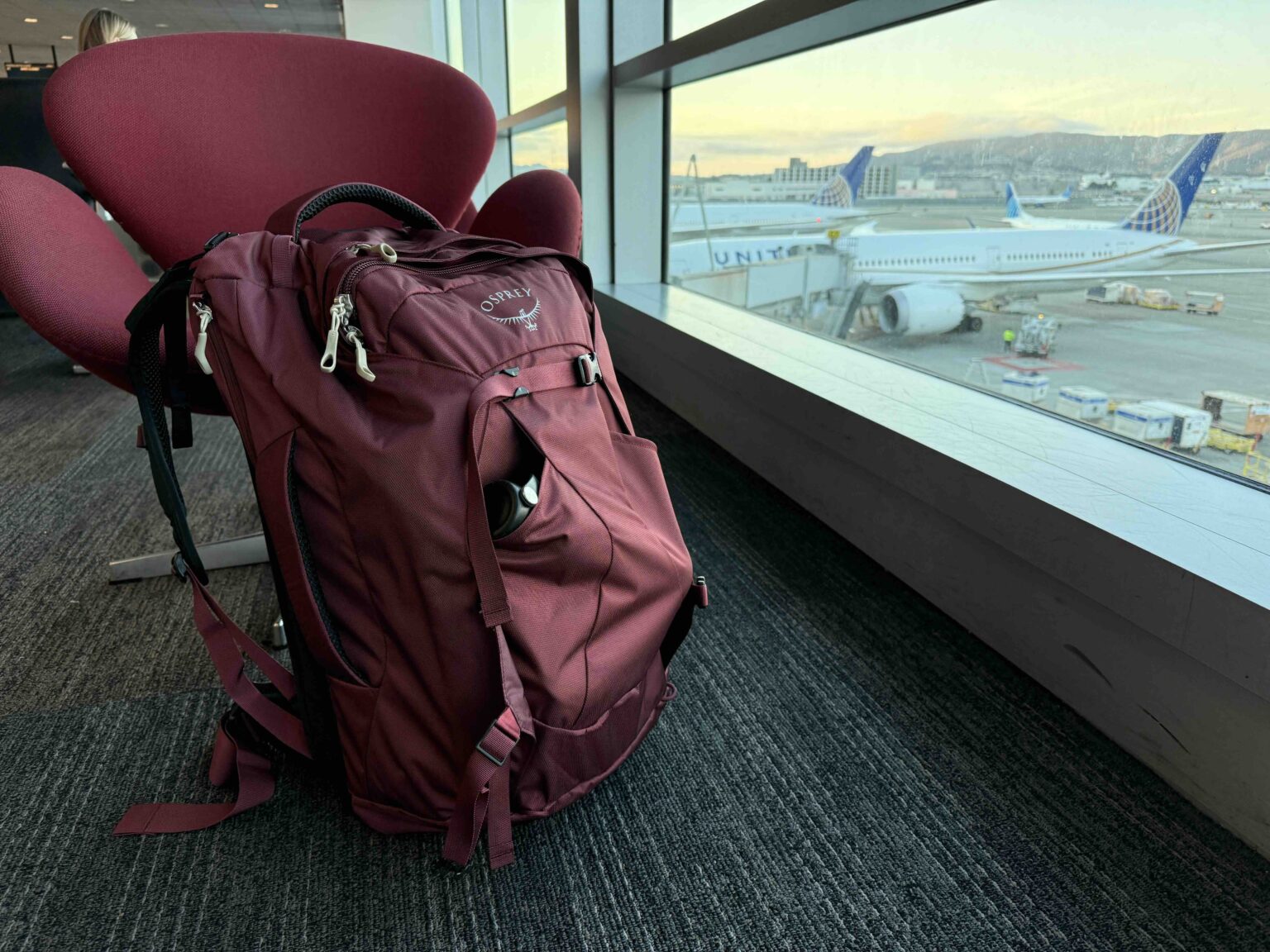It was 6 a.m. when my alarm went off — and rain pounded the gabled copper roof of the 300-year-old Daishinbo Pilgrim Lodge. Sunshine or not, I was in Japan to hike Mount Haguro on Honshu Island. If the downpour persisted, I would certainly find out whether my Osprey Fairview Travel Pack could duck any moisture.
The day trek follows one of the country’s oldest pilgrimage routes of the ancient Shugendō spiritual tradition, a blend of Shinto, Buddhism, and Daoism. Before meeting my Yamabushi guide, I adorned the customary attire: a white robe, a woven cord necklace — symbolizing a protective barrier — and a head wrap. (I opted for my Arc’teryx trail runners rather than straw sandals.)
I wasn’t anticipating a particularly challenging journey, but there was no way I’d be dry by the end. We were at a pretty low elevation, and it was fairly warm out, so I wasn’t overly concerned. But since this section follows a human-made stone path — including 2,446 steps — I really hoped that the Fairview’s suspension and lumbar support would live up to its name.
In short: With a 40L capacity, the Osprey Fairview 40 Travel Pack ($200) sits in the sweet spot for airline carry-on size restrictions and easily accommodates several days’ worth of clothing and essentials. After testing the pack on airplanes, bullet trains, and charter buses, plus a range of day hikes in Japan’s Tōhoku region, I found the women’s-specific Fairview provided excellent weight distribution, lumbar support, and suspension. The padded hip belt, adjustable torso length, and breathable back panel enhanced comfort for day hikes. The design is also loaded with travel-oriented details.
Our other favorite travel backpacks are highlighted in the Best Travel Backpacks buyer’s guide.
-
Supreme suspension system offers the best carry of any pack we tried -
External compression straps limit the volume well -
Comfortably padded grab handles
-
Not much internal organization
Field Testing: A Travel Backpack Fit for Hikes
Raised in Telluride, Colorado’s remote San Juan Mountains, it’s no surprise that I love to hike, including adventures and reporting that recently led to my induction as the 2025 North American Travel Journalist of the Year. The Adventure Travel Trade Association also selected me as one of three 2025 global media delegates to explore the natural wonders of Japan’s Tōhoku region.
I took two bags for a bustling week of outdoor adventures on the country’s northern Honshu Island. That included the Fairview 40 Travel Pack for daily hikes, airport travel, transfers, and carrying my laptop on flights.
When I jet set, I try to take a travel backpack that doubles as a day hiking pack. There are caveats to that frugality, but in the case of the Fairview 40 Travel Pack, it did well enough at both.
Altogether, I pulled on the Fairview for several hikes that totaled 14 miles. Beyond hiking Mount Haguro in the Yamagata Prefecture, the pack descended cliffside ladders and ascended steep, rocky faces on the Michinoku Coastal Trail. It was comfortable while bushwhacking through dense Japanese cedar, beech, and Mongolian oaks with Matagi hunter-gatherers in the Moriyoshi Mountains. It also served me on an out-and-back to the top of Mt. Issaikyo, with 1,200 feet of vertical, in Bandai-Asahi National Park.
I also traveled with a carry-on — the 40L Patagonia Black Hole Wheeled Duffel — which I rifled through each day for gear depending on the conditions. I brought along my rain jacket, various women’s travel pants, and dry bags for ocean kayaking.
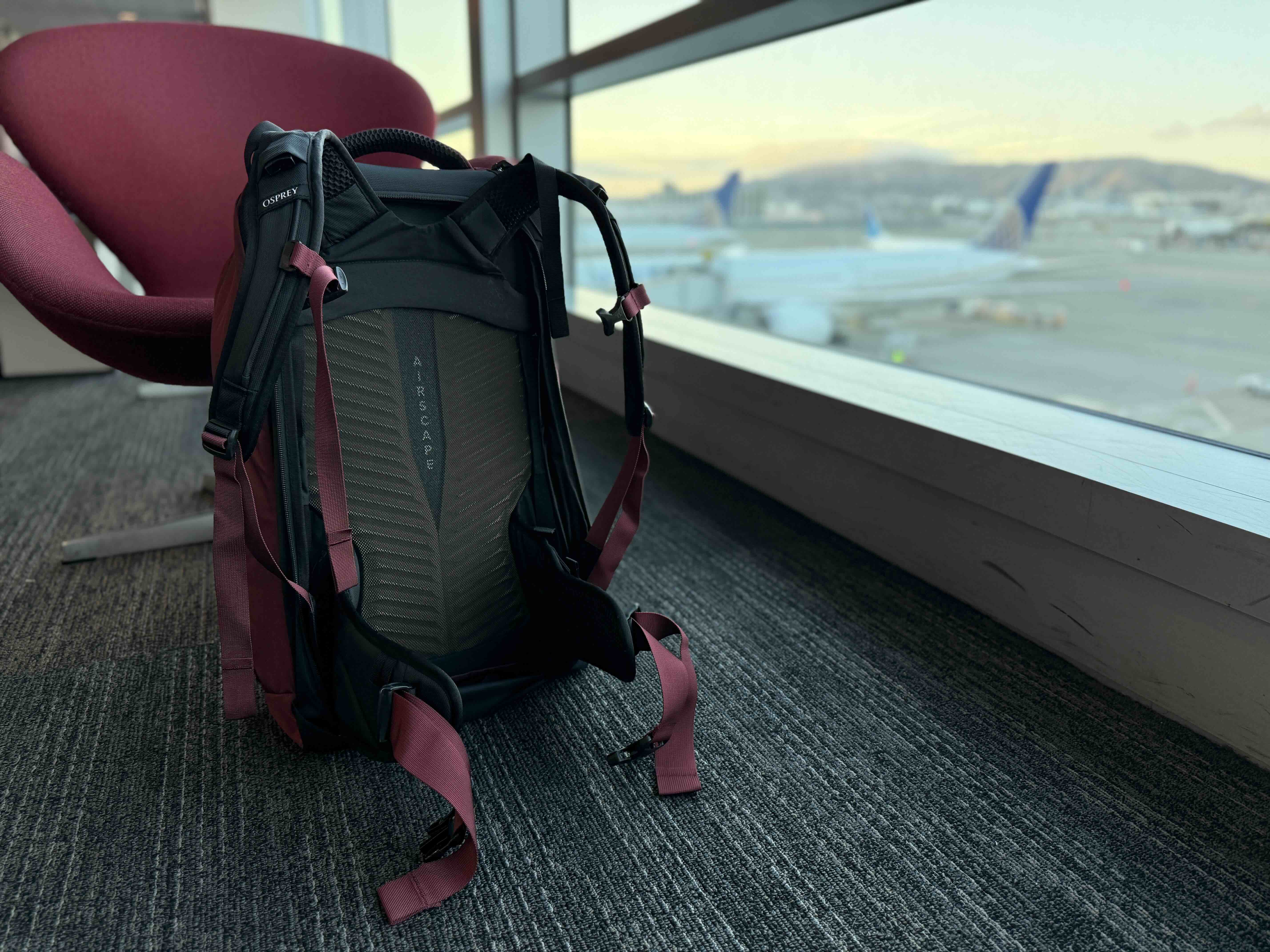
Supportive Suspension for Long Hauls
After a morning ritual and Shojin Ryori breakfast, our group of travelers walked to the Zuishin Gate, the start point of the hike of Mount Haguro. With a large, sweeping roof, there’s also generous space beneath to escape the rain.
“Please say, Uketamo (受けたもう) to nature,” said Master Kazuhiro Hayasaka, our Yamabushi mountain monk and guide. The ancient mantra means, I humbly accept all experiences on the journey and forces of nature. The irony of the ritual was not lost on me! I was already soaked — but at least my pack was comfortable.
I’ve tested other ski and hiking packs from Osprey, so I’m familiar with the brand’s dialed-in suspension systems. These packs definitely prioritize carry comfort and aeration.
The Fairview is no exception. This travel bag borrows heavily from the brand’s hiking packs — it even resembles a hiking pack when the shoulder straps are pulled out — and incorporates hiking details. The gallery includes a LightWire frame, load lifters, and a ventilated back panel with padded harness straps.
As a result, the pack distributes weight evenly and feels stable. The Haguro trek starts with a descent through a centuries-old cedar forest, and the pack felt stable and balanced on my hips with no swing weight.
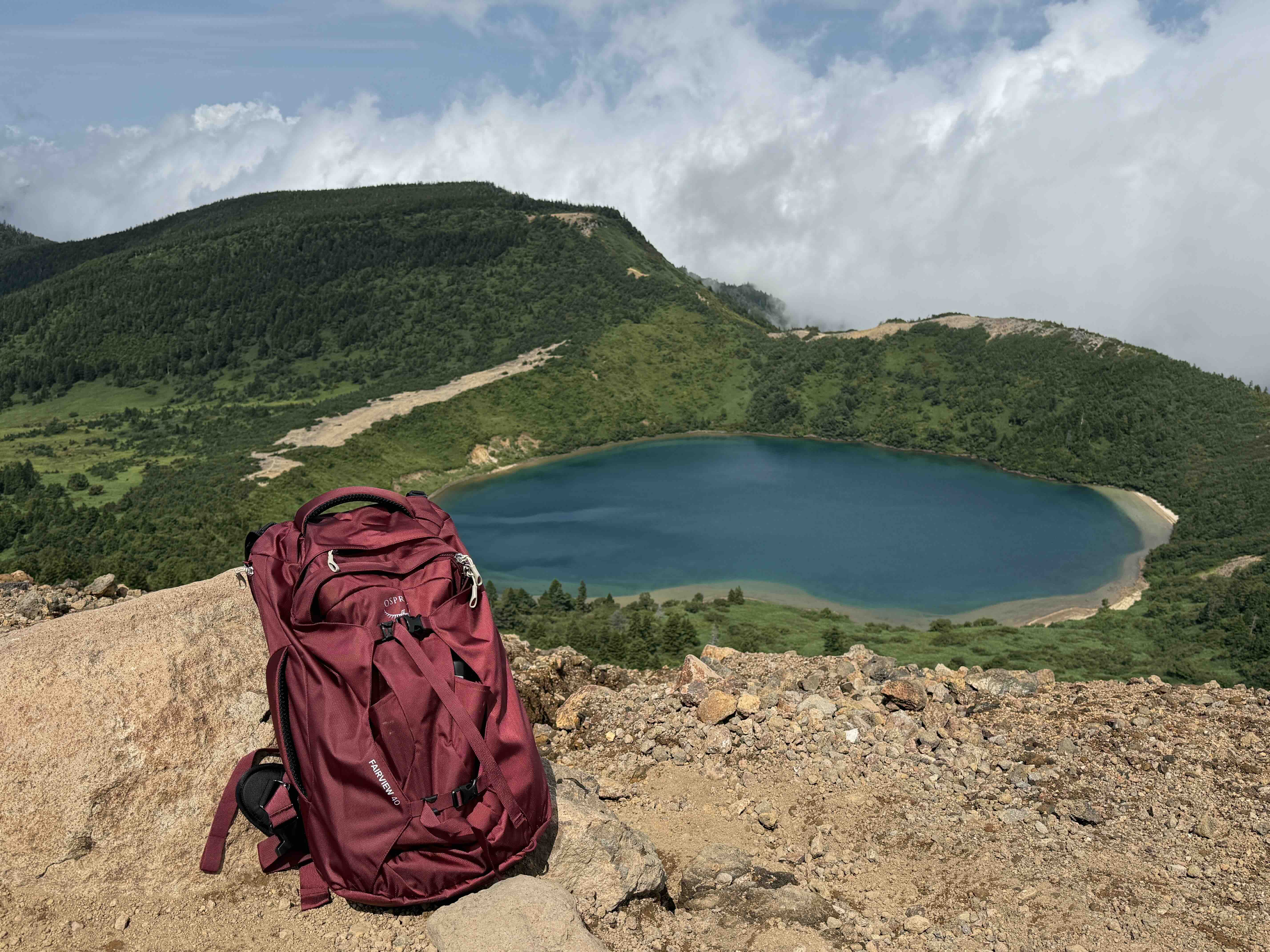
Travel-Specific Details
As I mentioned, the Fairview is sprinkled with travel-specific details: lockable sliders, an external pocket for toiletries (that fits a quart-sized bag), stashable hip belt and shoulder straps, grab handles, tough 450-denier fabric, plus a padded laptop sleeve that fits laptops up to 16 inches.
It’s a standard carry-on size that slides easily into overhead bins or beneath an airplane seat. While it lacks a few characteristics of a true hiking pack, it fits the bill if you’re trying to streamline your luggage. In my opinion, there’s hardly a more comfortable pack for long walks and heavy loads.
Adjustable Fit in a Travel Pack
Where many travel bags stick to a one-size-fits-all approach, Osprey broke the mold with a torso-length adjustment system. That level of customization is rare in luggage-style backpacks, giving the Fairview a distinct edge for extended trips.
The adjustment system is simple and easy to use: The shoulder straps slide along narrow rails with markers to make sure it’s level, and then are secured in place by tightening each compression strap that’s hidden near the hip belt.
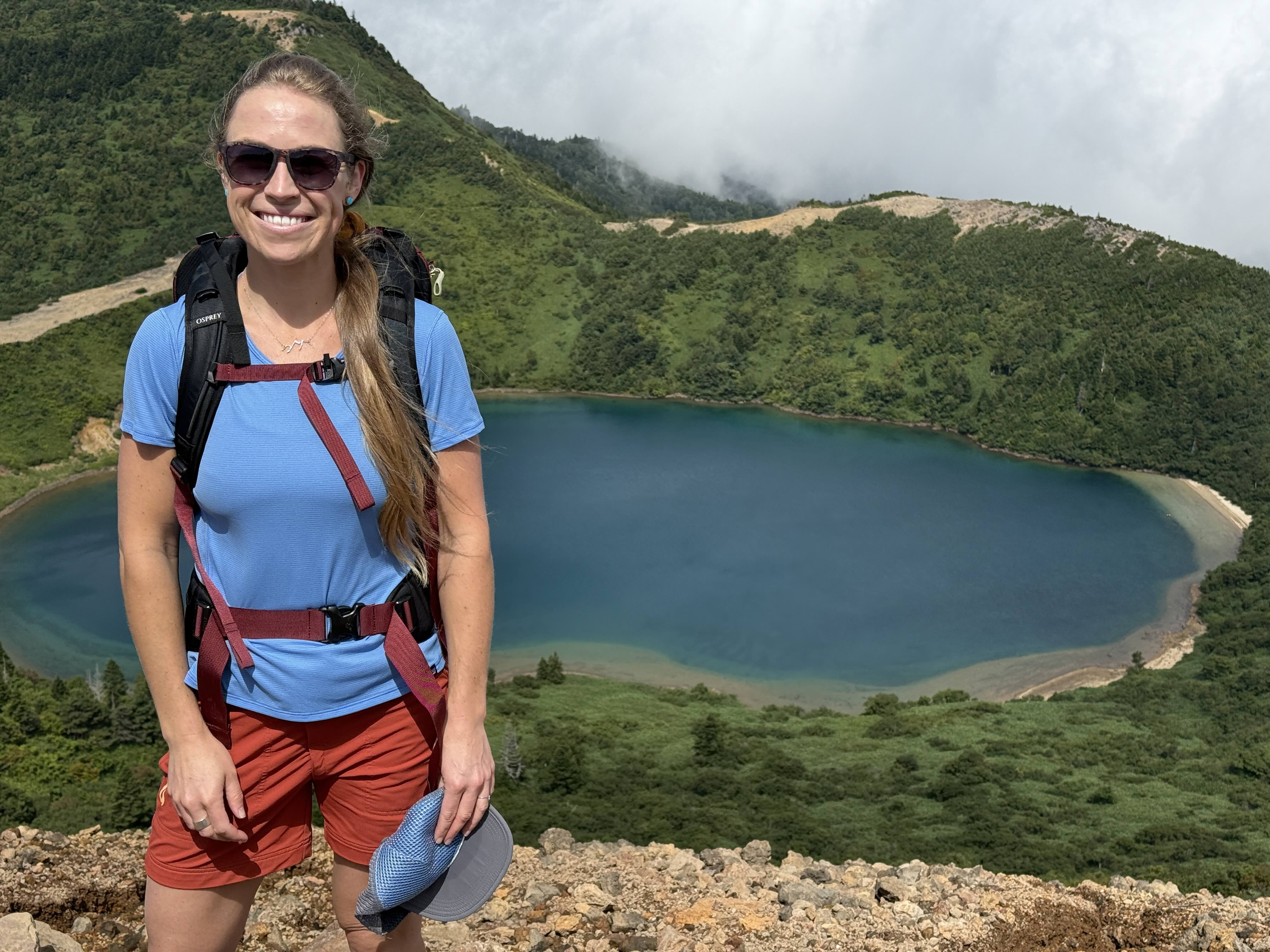
Strap Management & Handles
Unlike travel packs that hide a harness system inside the main body, the Fairview opts for a removable cover that zips over the suspension if you opt to check the bag.
There’s a padded hip belt (that I dig) and a chest strap with a whistle, and both are adjustable in length. The height of the chest strap can easily be customized by sliding each side along an integrated rail.
One of my favorite details of this pack are the two wide padded handles on the top and one side, which are friendly and easy to grab. You could even carry the pack like a briefcase while waiting in line at the airport. I’m just under 5’6″, so those touch points make moving the pack in and out of overhead bins that much easier.
Primary Compartment
Made with a clamshell opening, the front of the bag can peel completely open to access everything from cap to base. This was easiest done with the pack lying flat on the ground. I found the pack to be quite spacious. The side compression straps were great when I didn’t have the volume fully loaded on day hikes.
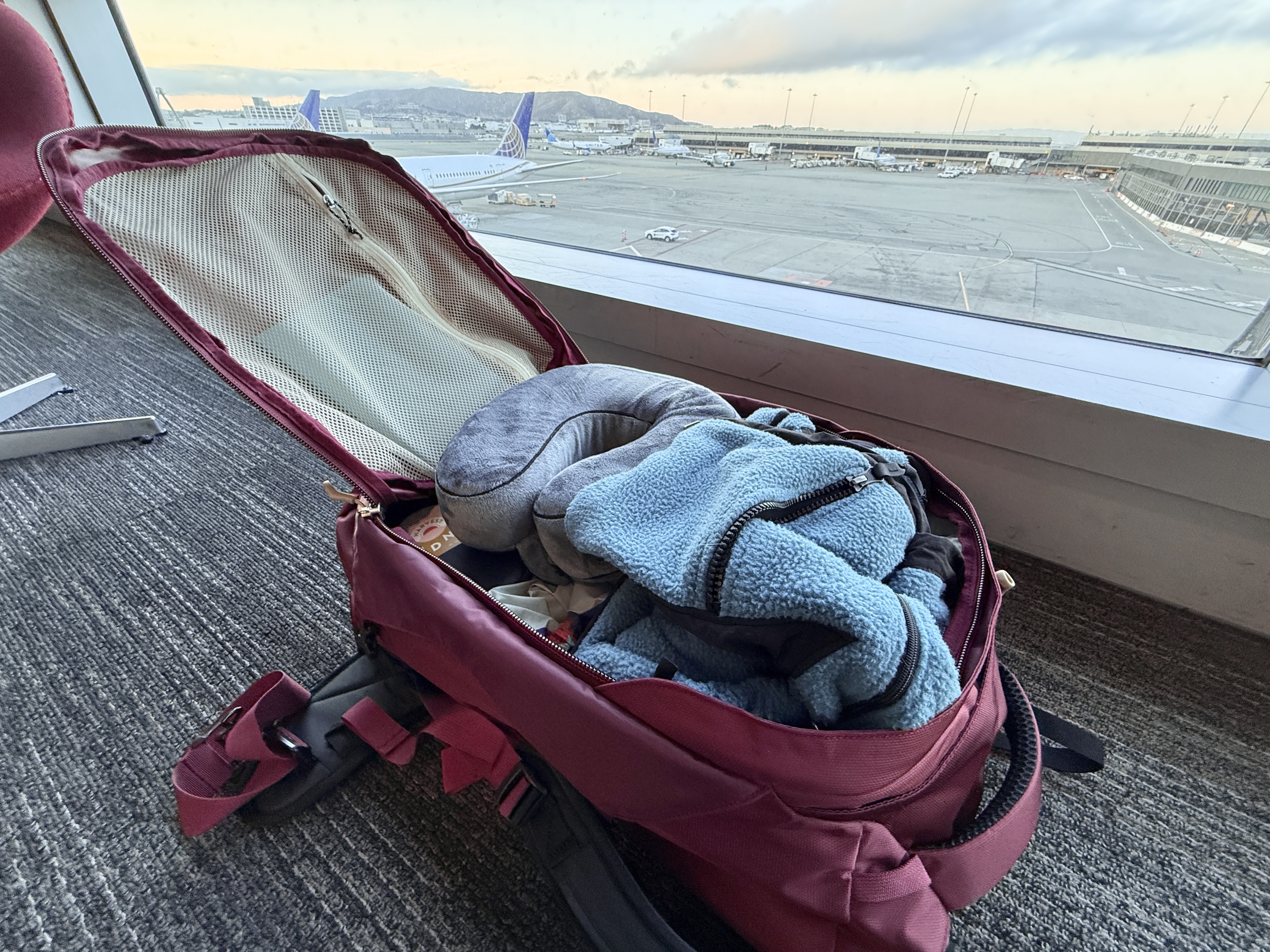
To enter the top of the primary compartment, you can leave the front compression straps buckled and unzip the two zippers for a partial opening. To reach further into the bag, you need to unclip one or both of the compression straps.
The sliders are lockable to the main compartment — you just need to supply your own luggage lock.
Packing Layout & External Pockets
The layout is minimalist. There’s a separate padded laptop compartment that’s accessed from a top-to-bottom side zipper.
There’s one small zippered pocket at the top, which is intended for toiletries during air travel. It fits a standard quart-sized ziplock bag full of liquid less than 3.4 ounces each.
On the front, a large kangaroo pocket has two vertical side openings. The pouch was large enough to slide in my 21-ounce Hydro Flask water bottle and a second bottle.
Two compression straps go across the hammock to help secure the bottles or other gear like my wet hiking shoes when I changed into sandals.

One side of the hip belt has a stretch mesh pocket. I used it for shoving trash along the trail (Japan has very few public trash receptacles). The other side has a small attachment loop. Two sturdy attachment loops are at the top of the pack and another two at the bottom for clipping gear.
Internal Pockets
Inside the pack is a large zippered pocket for organization: a great spot for a journal or map. There are two compression straps for securing gear inside, like a fleece jacket.
From inside the pack, you can see the padded laptop sleeve. This part of the design is a bit confusing to me. The sleeve is partially detachable. The other side of the sleeve is fixed (where the laptop slides into the sleeve from the exterior zipper).
The end that can be freed has two attachment toggles that slide into loops. I could slide documents beneath the laptop sleeve, preventing them from getting crumpled. But I always kept the toggles latched so that my laptop was stable during transit.
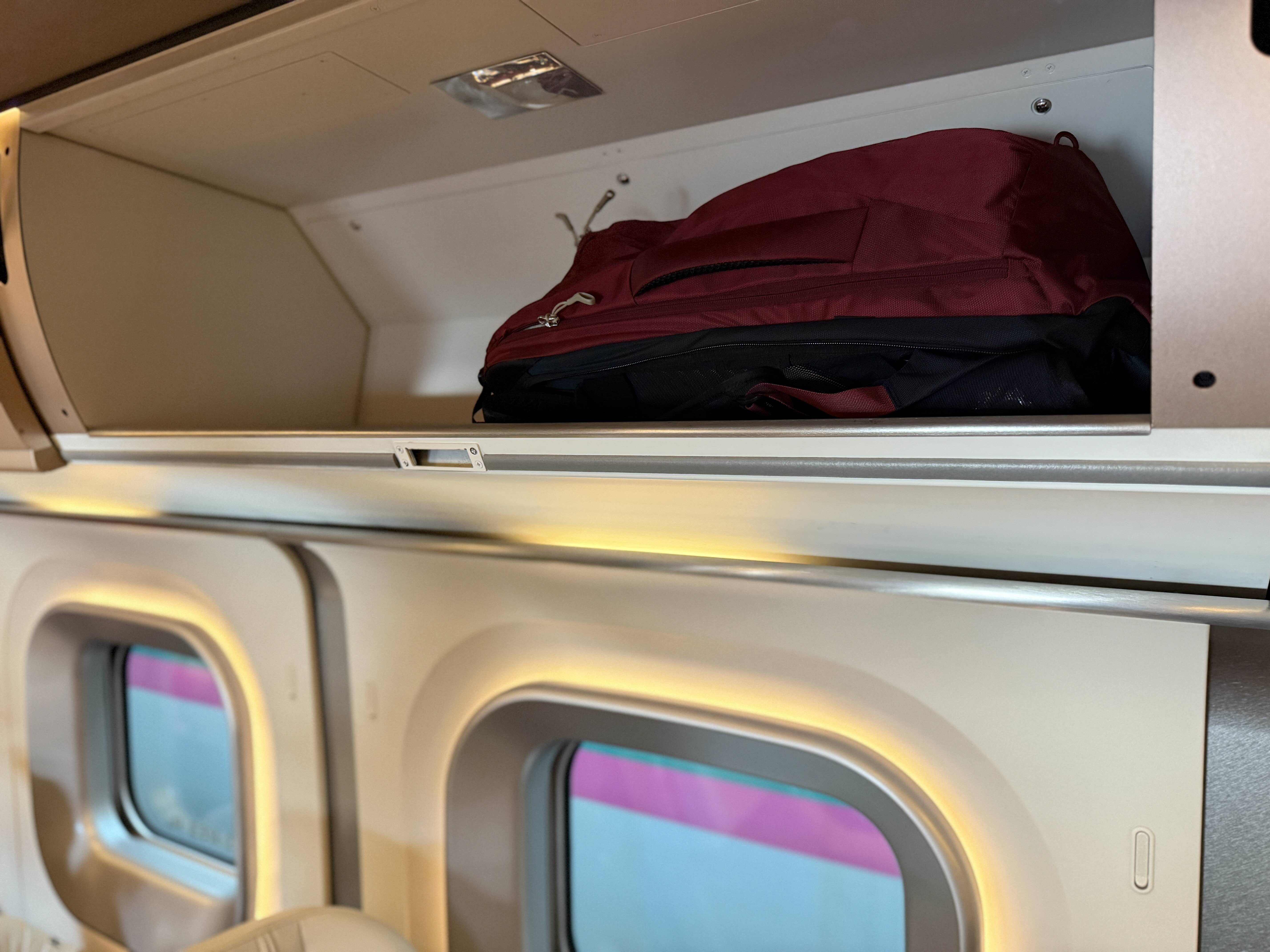
Critiques
By the time I reached the Sanjingosaiden Shrine on Mount Haguro’s summit, everything inside my pack was completely soaked. The 2-mile hike had 900 feet of climbing and took about 2 hours. We wove past the Haraigawa River’s Shinkyo Bridge, Suganotaki Falls, and more than 100 Massha shrines. After visiting a millennium-old five-storied Pagoda, we stopped inside the Ni-no-zaka Teahouse for matcha. But my pack was in the rain consistently with no coverage.
The fabric of the Fairview’s main compartment, liner, and base is treated with a PFAS-free DWR, but it’s certainly not dependable. I wish the DWR were more serviceable and shielded a portion of the rain. Better yet, I’d love to see an integrated rain cover that stows away in a zippered pocket at the base.
Overall, the Fairview is comfortable, carries well, and offers roomy interior space. But the limited quantity of pockets might leave some travelers dissatisfied. For day hikes, I missed having side pockets for my water bottles, so that I could grab them without fully taking the pack off. There’s only one pocket on the hip belt. Inside, the single large zippered pocket makes it hard to stay organized with smaller items.
While the pack offers plenty of utility, it feels a tad overbuilt with strap management. The Atilon framesheet looks a bit tall, too. It could get in the way if you have thick hair or are carrying a neck pillow in the airport.

Conclusion: Who It’s For
For an international adventure, the 40L Osprey Fairview 40 Travel Pack was an adaptable, comfortable design for hopping between several flights from North America to Japan.
I loved the pack’s ability to distribute weight evenly without side-to-side movement. The padded hip belt and lumbar support is a premium detail for me. That way, the grams aren’t all loaded on my trapezius muscles. I also tend to break a sweat on climbs, so the breathable back panel is a huge plus.
There’s a men’s specific version, the Farpoint 40 Travel Pack. Stepping up the modularity, the Fairview 40 is compatible with the 15L Fairview Daypack ($65). You can attach the Daypack to other bags in the lineup, including the Travel Pack.
There are buckles on the front, so you can opt to carry the day pack on your chest. Alternatively, the two compression straps on the Fairview’s back can be threaded through the daypack. While I didn’t test the Daypack, it seems like a pretty sweet combo. Plus, the Daypack has two mesh water bottle sleeves.
Considering this pack’s travel specificity, it’s unique that it works as well for hikes as it does for flights. While it doesn’t excel as a hiking-specific pack, it’s versatile enough for both flights and short hikes. Just remember to bring along a rain cover.
Read the full article here



